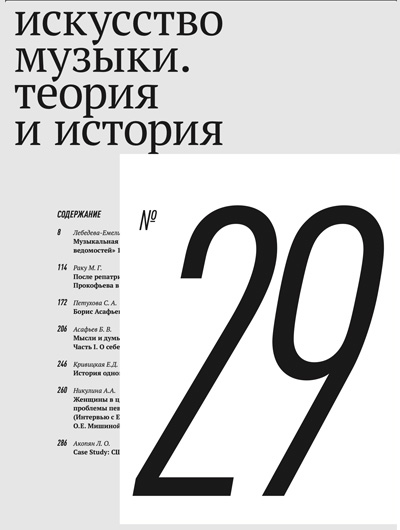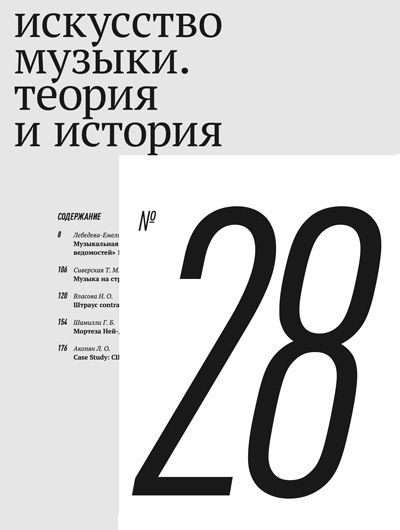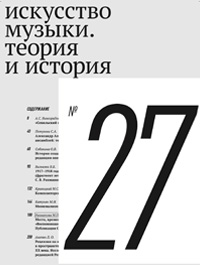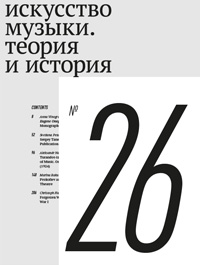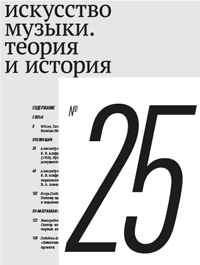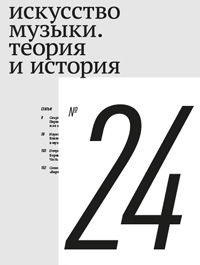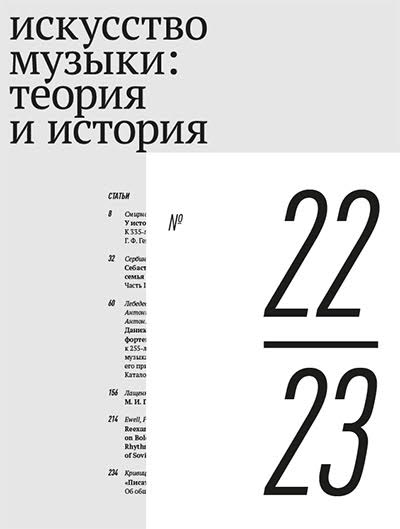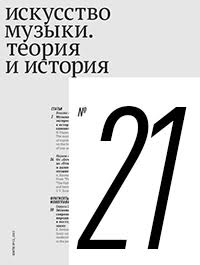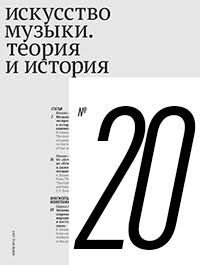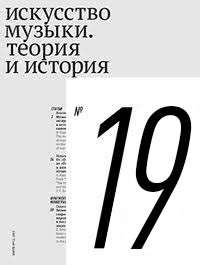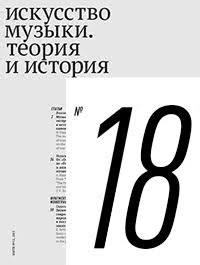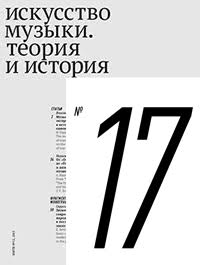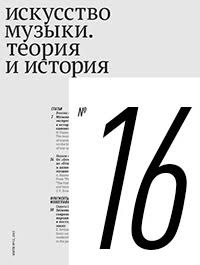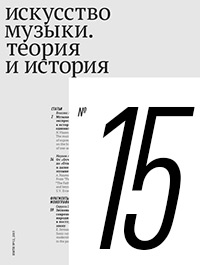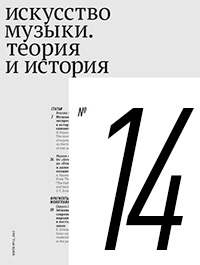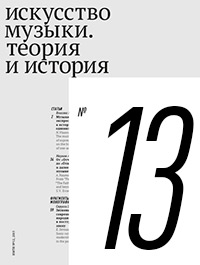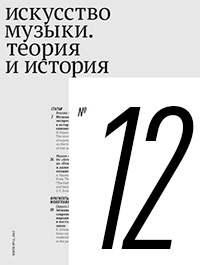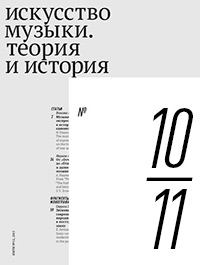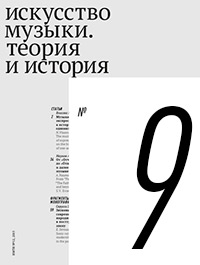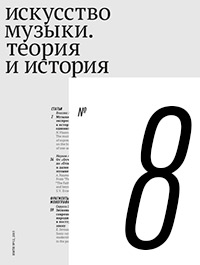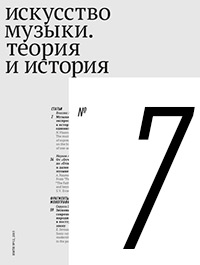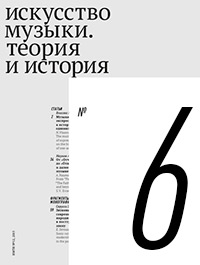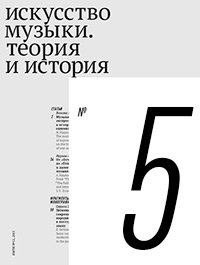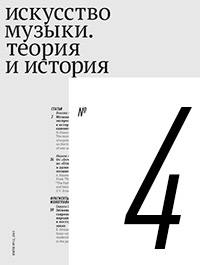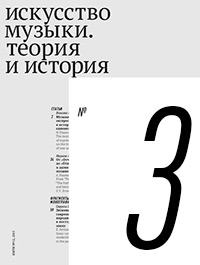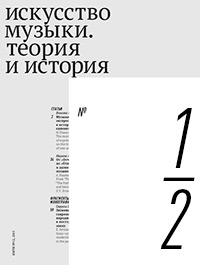2021 ¹ 25
Russian minimalist music is a postmodern, national and culturally-bound variant of (early) American minimalist music that first emerged in the Soviet Union during the early to mid-Seventies. Its key exponents are Vladimir Martynov (b. 1946), Alexander Knaifel (b. 1943), Nikolai Korndorf (1947–2001), Alexandre Rabinovitch-Barakovsky (b. 1945) and Georgi Pelecis (b. 1947), to name the most prominent of the first generation, with Sergei Zagny (b. 1960), Pavel Karmanov (b. 1970) and Anton Batagov (b. 1965) being major figures within the second generation. Similar to early American minimalist music in both style and technique, Russian minimalist music differs primarily in that its main aim is to function as a discourse conveying some important, weighty meanings. Often labelled ‘maximalist’ as a result, this aspect renders Russian minimalist music paradoxical in that it aims to signify or convey far more than its transparent form and minimal signifiers suggest. It is also a phenomenon not without controversy, given its hybrid qualities. In this article I will examine Russian minimalist music as an aesthetic and compositional identity and consider how it differs from its American counterpart. I will explore how these composers’ own perceptions of American minimalist music has led to them to create a unique, ‘Russian’ and in some respects, problematic variant. I will also look at some of the Russian-Western minimalist collaborations that have occurred: Martynov being commissioned by the Kronos Quartet, and Anton Batagov being commissioned by Philip Glass. The material of the article is partly based on my interviews with Russian composers and music scholars.
Key Words
Minimalist music, Russian minimalism, maximalist, Vladmir Martynov, Alexander Knaifel, Nikolai Korndorf, Alexandre Rabinovitch-Barakovsky, Sergei Zagny, Pavel Karmanov, Anton Batagov, Vita Nova.
The set of materials pertaining to Boris Asaf’yev’s work on Modest Musorgsky’s legacy consists of three interrelated parts: (1) introductory article; (2) the previously unpublished correspondence between Asaf’yev and Lamm from January – February 1928; (3) the first version of Asaf’yev’s article ‘Why Musorgsky’s Boris Godunov should be performed in its original version?’ On the basis of the archival materials from the Russian State Archive of Literature and Art, Russian National Museum of Music and the Museum of the Bolshoy Theatre, a large panorama of creative, scholarly and organizational problems is presented, which emerged in the beginning of 1928 during the period of active preparations for the première of Boris Godunov in the State Academic Theatre of Opera and Ballet (GATOB) and the work on the collection of articles ‘To the Restoration of Musorgsky’s Boris Godunov’. It is shown for the first time that the colleagues working on the ‘restoration of authentic Musorgsky’ entered into conflict, which would later lead to Lamm’s refusal to accept Asaf’yev’s orchestration of Khovanshchina (1931) and to the interruption of both scholars’ work on the publication of Musorgsky’s Complete Works.
Key Words
M. P. Musorgsky, B. V. Asaf’yev, Igor’ Glebov, P. A. Lamm, N. A. Rimsky-Korsakov, A. N. Rimsky-Korsakov, opera Boris Godunov, GATOB.
The present material introduces the previously unpublished correspondence between Boris Asaf’yev and Pavel Lamm dating from 13 January – 2(?) February 1928. The intensity of both scholars’ communication during those days was related to Asaf’yev’s active work on the articles for the collection ‘To the Restoration of Musorgsky’s Boris Godunov’ and on their revision in accordance with Lamm’s criticism. The publication of the collection was scheduled for the première of the opera in the edition of Lamm and Asaf’yev at the Leningrad State Academic Theatre of Opera and Ballet (GATOB), which took place on 16 February 1928. Lamm’s letter of 13 January criticizing the original text of Asaf’yev’s article ‘Why Musorgsky’s Boris Godunov should be performed in its original version?’ stands out among the whole correspondence. This document contains Asaf’yev’s numerous marginalia and comments referring to Lamm’s observations. Taking into account the importance of Asaf’yev’s reasons, as well as their emotional tone, in the footnotes to our article we have quoted not only the excerpts from the article that gave rise to Lamm’s objections, but also Asaf’yev’s comments to these objections. The editor has deciphered the abbreviations and corrected the slips of the pen, errors, and other inaccuracies in the texts of the documents.
Key Words
M. P. Musorgsky, B. V. Asaf’yev, Igor’ Glebov, P. A. Lamm, N. A. Rimsky-Korsakov, A. N. Rimsky-Korsakov, opera Boris Godunov, GATOB, correspondence.
The present publication introduces the first version of Boris Asaf’yev’s article ‘Why Musorgsky’s Boris Godunov should be performed in its original version?’ The text is reproduced after the fair typescript found in P. A. Lamm’s file at the Russian State Archive of Literature and Art. The article’s second version was published and is well known. However, the publication of the article’s first version is important inasmuch as it helps to understand the essence of the conflict that broke out between Asaf’yev and Pavel Lamm around this text and later led to their dramatic disagreement regarding the understanding of Musorgsky’s oeuvre as a whole.
Key Words
M. P. Musorgsky, B. V. Asaf’yev, opera Boris Godunov, N. A. Rimsky-Korsakov, State Academic Theatre of Opera and Ballet.
Appendices 1 and 2 to the essay devoted to the activities of Boris Dobrokhotov in the discovery, restoration, and editing of the works of Russian classics (1946–1988). The main text of the essay was published in the previous issue of our journal. Appendix 1 is the list of Dobrokhotov’s publications; Appendix 2 comprises music examples that were not included in the main text.
Key Words
B. V. Dobrokhotov, A. Alyabyev, J. S. Bach, A. Vivaldi, S. Rakhmaninov, A. Verstovsky, transcriptions, editions.
This is the first attempt to examine the biography and works of Nadezhda Tumanina, an outstanding Russian musicologist, staff member of the Moscow Conservatoire (1944–1968) and the State Institute for Art Studies (1951–1968). The appendix contains a list of Tumanina’s writings, also compiled for the first time from various sources.
Key Words
N. V. Tumanina, V. E. Ferman, T. N. Livanova, Musorgsky, Weber, Wagner, Great Patriotic War, dissertation, history of Russian music, Tchaikovsky.
This paper is devoted to the first period of activity of the Department of Music Histo-fi ry of the State Institute for Art Studies (SIAS) – the years preceding the publication of the Communist Party’s resolution on the opera The Great Friendship (1948), which had a destructive effect on the research activities of musicologists. The projects and scholarly developments that were transformed or banned that year still provide a valuable material for research.
Key Words
SIAS, Department of Music History, Asaf’yev B. V., Garbuzov N. A., Ferman V. E., Livanova T. N., Konen V. D., Keldysh Yu. V.
The project Monuments of Russian Art Music, realized by the staff of the Department of Music of the State Institute for Art Studies in the 1960–90s, contributed to the revival of a number of forgotten works from the 16–18th centuries. The published rarities include singing manuals, pieces of vocal and instrumental music, and early Russian operas. The project was initiated in the late 1940s by Boris Asaf’yev, and it makes sense to revive it now, since the series could be continued virtually ad infinitum. The time has come to broaden the chronological scope of the series and to include in it the 19th century Russian operas, as well as numerous sacred and secular choral works and instrumental pieces, if only the project is supported by the Ministry of Culture and scholarly funds as having a priority value for Russian culture.
Key Words
Monuments of Russian Art Music, Russian music of the 16–18th centuries, State Institute for Art Studies, Department of music, Yu. V. Keldïsh, O. E. Levasheva, E. M. Levashev, M. V. Brazhnikov.
